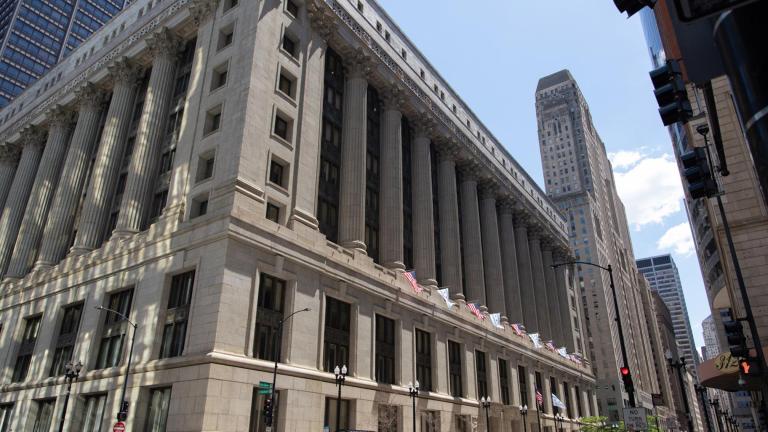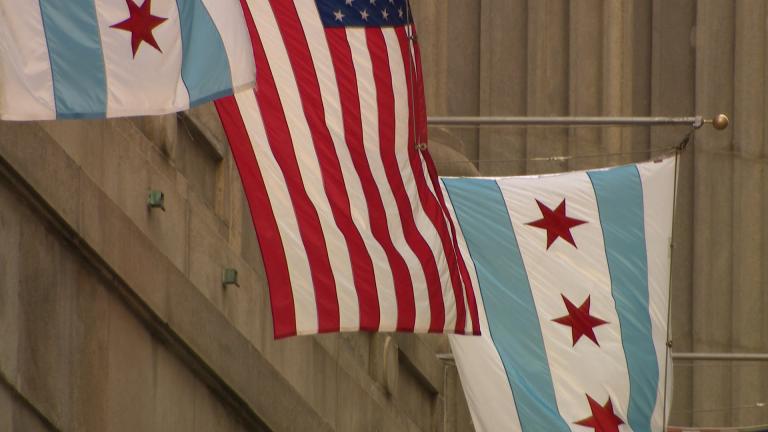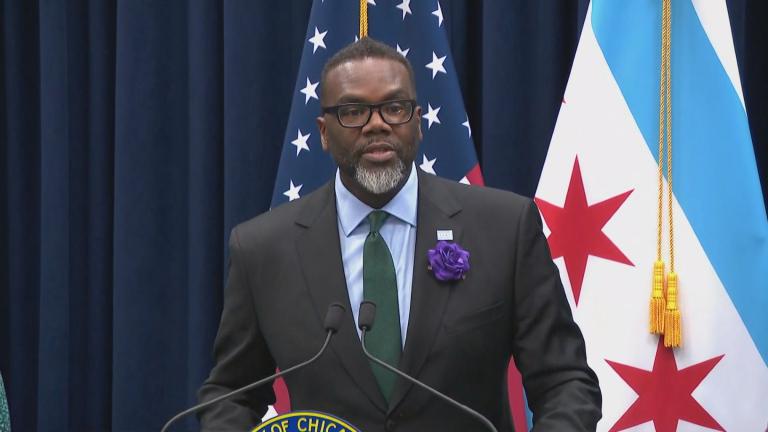Video: Ald. Maria Hadden (49th Ward), Ald. Raymond Lopez (15th Ward) and Ald. Jeanette Taylor (20th Ward) discuss the latest City Council news. (Produced by Marissa Nelson)
A trio of City Council members blasted Mayor Lori Lightfoot’s plan to fight crime by going after the profits earned by Chicago’s gangs in an interview Monday on “Chicago Tonight.”
Ald. Maria Hadden (49th Ward), Ald. Raymond Lopez (15th Ward) and Ald. Jeanette Taylor (20th Ward) agreed that the measure — set for a final vote Wednesday — would do nothing to stop the surge in homicides, carjackings and other violent crimes, but would target Black and Latino Chicagoans.
“It sounds nice,” said Lopez, who has been among Lightfoot’s most consistent critics on the City Council. “None of this is going to deter crime in the city of Chicago.”
Lopez said the proposal took a “1920s Prohibition Era” approach at a time when Chicago’s gangs are fractured and are not hierarchical organizations.
“This is going to net all the wrong people and all the wrong assets,” Lopez said.
Ald. Jason Ervin (28th Ward) was the only alderperson to speak in support of the measure during a hearing before the Chicago City Council’s Public Safety Committee on Thursday. Originally scheduled to join the panel, Ervin was unable to join the conversation.
“We want tools that are going to help curtail the activity that’s happening on the street,” Ervin said Thursday, adding that the residents of his West Side ward are desperate for new strategies to fight crime.
This measure is a “diversion” that would not fight crime but waste taxpayer resources, Hadden said.
Originally targeted at all gang members, the proposal was scaled back only to include gangs and adult gang leaders.
The measure calls for each offense to be punished with fines ranging from $10,000 to $15,000 for first offenses and $20,000 to $30,000 for second offenses. Lightfoot has promised that at least half of the fines collected by the city would have to be earmarked to help the victims of gang crimes.
Had the law been in place in 2020, it could have been used in 258 cases to seize $570,000 in cash and property, according to data compiled by the Chicago Police Department. In 2021, it could have been used in 220 cases to seize $539,000, according to the data.
Between August 2019 and Dec. 31, 2021, 94% of all cases where assets could have been seized amounted to less than $20,000, according to data provided by Hadden.
“This ordinance will likely violate people’s civil rights and cause unnecessary harm to our residents,” Hadden said.
The Chicago Police Department has been ordered by a federal judge to change the way it operates to ensure that officers do not violate the constitutional rights of Black and Latino Chicagoans.
“This is nothing but a Band Aid on a bullet wound,” Taylor said. “You’re revictimizing people.”
Lopez said the measure would serve as nothing more than a “headline grab.”
Deputy Mayor for Public Safety John O’Malley and Chicago Police Department Deputy Chief Ernest Cato told alderpeople the measure would give them a new way to fight crime by threatening the only thing that gang leaders care about — their money.
O’Malley and Cato were repeatedly pressed by members of the City Council’s Progressive Caucus to share evidence backed up by data that similar laws had been effective in reducing gang violence. Both acknowledged that they have no evidence to show that the proposal has worked in other cities and states.
Cook County Public Defender Sharone Mitchell has led the opposition to the measure, saying that it would only be used “to take a lot of Camrys and Civics from unsuspecting grandmas, they’ll sue a bunch of poor people that the city will end (up) having to pay damages back to …. and it’ll do nothing to actually stop shootings.”
The measure is also opposed by the ACLU of Illinois and Fraternal Order of Police Lodge 7 President John Catanzara who called it “political theater.”
The measure requires those facing the loss of property to be notified before the court case against them begins in earnest. Owners could prevent the loss of their property by convincing a judge they did not know it had been used for criminal purposes or “acquired through street gang related activity.”
In addition, if the city is seeking to seize a car, a family member could be given the vehicle if they can prove the loss of the vehicle would cause a financial hardship because they need it to get to work or to transport other family members, according to the proposal.
Police Misconduct Settlement
The City Council will also consider settling a lawsuit for $1.67 million filed by five people who were pulled from their car by seven Chicago police officers during the unrest that swept the city after the police murder of George Floyd during the summer of 2020.
Hadden said the behavior of the officers who were caught on tape when a swarm of officers approached the car and began using their batons to smash the car’s windows and demanded that they get out of the vehicle was “completely unacceptable.”
“It was like watching a Rodney King video,” Hadden said. “The violence, the brutality was textbook unnecessary.”
Assistant Corporation Counsel Caroline Fronczak said the probe of the incident by the Civilian Office of Police Accountability uncovered no evidence that tied Mia Wright, Tnika Tate, Kim Woods, Ebony Wilbourn and Javon Hill to any criminal activity.
“The question we should ask is what if we didn’t have a video,” Taylor said. “No matter how much money we give them they can’t get back what was taken from them — a sense of safety from the people who are paid to serve and protect. They are picking and choosing who they serve and protect.”
Video: Ald. Maria Hadden (49th Ward), Ald. Raymond Lopez (15th Ward) and Ald. Jeanette Taylor (20th Ward) discuss the latest City Council news. (Produced by Marissa Nelson)
COVID-19 Mitigations in Flux
Chicago could be less than 12 days away from lifting its mask mandate and the requirement that patrons of restaurants, fitness centers and bars show proof of vaccination, as confirmed cases of COVID-19 as well as hospitalizations continue dropping steeply.
That would be a mistake, Taylor said.
“What we are going to see is Black and Latinx folks die at a higher rate,” Taylor said, adding that she expects the mask mandate to be re-imposed once cases surge again.
Gov. J.B. Pritzker is set to lift the state’s mask mandate on Feb. 28 as cases of COVID-19 are no longer overwhelming hospitals across the state.
City officials assess the risk posed by COVID-19 with four metrics: the number of confirmed cases, the number of positive tests as compared with all tests taken, the number of hospital beds occupied by COVID-19 patients and the number of intensive care unit beds occupied by COVID-19 patients.
At least three of those four metrics will have to peg the risk of COVID-19 transmission at a “lower” rate for two weeks before the city lifts its mask and vaccine mandates, Chicago officials said. Two weeks is a full incubation period for COVID-19, according to federal health officials.
Three of those four risk metrics show COVID-19 poses a “lower risk” or “low risk,” according to city data from Sunday. Only the number of COVID-19 cases poses a “substantial risk,” according to that data.
An average of 283 Chicagoans have been diagnosed each day with the coronavirus during the past week, a 37% drop as compared with the previous week, according to Chicago Department of Public Health data.
The city’s test positivity rate is 1.5%, down from 2% the previous week, while the number of tests dropped 13%, according to city data.
Daily hospitalizations dropped 29% in the past seven days, and 76.5% of all Chicagoans have gotten at least one dose of the COVID-19 vaccine, according to city data.








